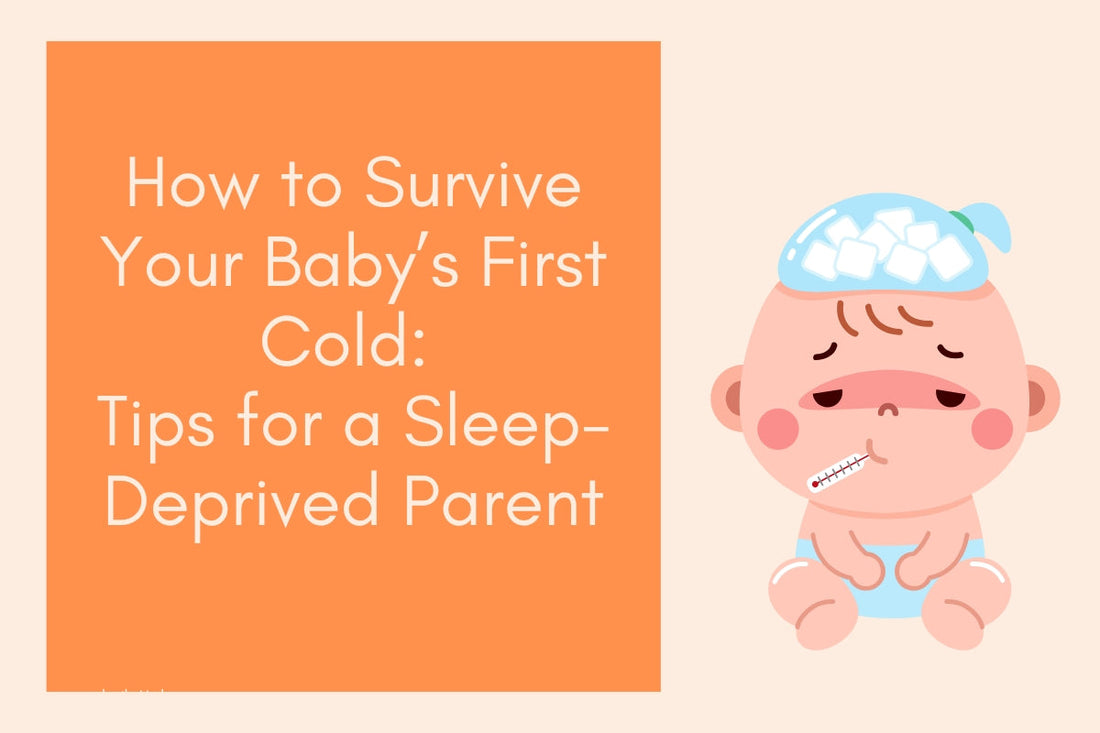Your baby’s first cold always seems to come out of nowhere — one day they’re giggling and rolling, the next they’re clingy, coughing, and dripping from every orifice. Welcome to sick season, where sleep is rare, emotions are high, and tissues run out faster than snacks at a playdate.
If you're reading this in the middle of a cough-filled night, wiping noses and Googling "how long does baby cold last" — take a deep breath. You’re not alone. And while we’re not medical professionals here at Polyglot Tales, we are parents who’ve been through it.
Here’s a practical, no-fluff guide to surviving your baby’s first (and second... and third...) cold — written by someone who knows what it's like to function on 3 hours of broken sleep and cold coffee.
1. Keep a Sick Season Toolkit Nearby
Set yourself up with a sick season caddy — something easy to grab when your baby is crying and your brain is foggy.
Handy things to include:
-
A roll of soft tissues or reusable cloths
-
Saline spray or drops (your GP or pharmacist can recommend what's suitable)
-
Nasal aspirator
-
Thermometer
-
Spare dummies/pacifiers
-
Nappy cream (noses aren’t the only things getting raw)
-
A ziplock bag or bin for used tissues
-
A bucket or towel near the bed (trust us — coughing often leads to vomiting)
Even a basic setup like this can help you feel a bit more in control at 2 AM.
2. Make Their Bedside (and Yours) Sick-Season Friendly
Cold symptoms in babies often get worse at night. They can’t blow their noses, they can’t clear their throats — and lying flat makes it harder. While always following safe sleep guidelines, here are some comfort tips:
-
Layer the sheets: Put down a waterproof sheet, then a normal one, then another waterproof one, and another sheet. That way, if there's a spew, you can strip a layer and get back to bed faster.
-
Keep a bucket or towel nearby: Because coughing + mucus = surprise vomit.
-
Nightlight and tissues within reach: So you don’t stub your toe mid-cough attack.
-
For toddlers: Offer icy poles to soothe sore throats and encourage hydration. Frozen watermelon, yoghurt tubes, or electrolyte ice blocks are winners.
3. Hydration, Hydration, Hydration
When in doubt — offer fluids. Babies (and toddlers) may refuse to eat but still accept breastmilk, formula, or sips of water if they’re old enough.
If they’re fussy, try:
-
Offering milk or water more frequently but in smaller amounts
-
Freezing breastmilk/formula into ice blocks for older babies
-
Letting toddlers drink through a novelty straw — it’s a small win
4. Embrace Screen Time, Snuggles, and Shortcuts
Now is not the time to feel guilty about routines flying out the window. If your baby only sleeps upright on your chest while Bluey plays in the background — so be it. If your toddler eats plain toast and watches Moana three times in a row — that's survival, not failure.
And if you’re up for it, a quiet storybook — even just flipping through the pictures — can be a beautiful, low-pressure bonding moment.
📚 We recommend sturdy board books or bilingual picture books you can read in your home language — comforting, familiar, and screen-free.
5. Look After You, Too
It’s hard to look after a sick baby when you’re running on empty. Try to steal moments of rest where you can — and prep yourself a “parent survival station” too:
-
Water bottle
-
Quick snacks (muesli bars, crackers, chocolate — no judgment)
-
Phone charger
-
Comfy hoodie
-
A light read or something funny to scroll (parent memes are medicine)
You don’t have to be a hero — you just have to keep going. Even slow counts.
6. Remember — This is Normal
Coughs that won’t quit, endless nose wiping, and grumpy, clingy days — it’s all part of the ride. Babies get sick. Often. Especially if they’re in daycare, have older siblings, or it's winter in Australia.
Signs that should send you to a doctor? Always trust your instincts. If you're worried, don’t hesitate to check with your GP or nurse helpline. It’s always okay to ask.
7. Bonus Tip: Books Make Great Sick-Day Companions
When you’re housebound for days, books are a wonderful way to pass the time — especially when you’re too tired to think up games or activities.
Even just pointing to pictures, repeating words, or reading familiar stories in your home language can:
-
Offer comfort and routine
-
Help your child hear your voice
-
Strengthen their connection to your family’s culture and language
At Polyglot Tales, we stock beautiful storybooks in Hindi, Japanese, Italian, Simplified and Traditional Chinese — curated for bilingual families in Australia. Whether you’re snuggled on the couch or stuck in a chair under a napping baby, a gentle story can go a long way.
👉 Explore our cosy sick-day reads here
You’re Doing Great
Sick season is brutal — not just for your baby, but for you too. The long nights, the endless wiping, the worry, the lack of rest — it’s a lot. But the fact that you're here, looking for ways to make it through, already says everything.
It won’t always feel this hard. One day soon, the runny noses will dry up, the coughs will fade, and your little one will be bouncing again. Until then — snuggle up, slow down, and stock up on tissues.
And maybe a few storybooks, too. 😉

